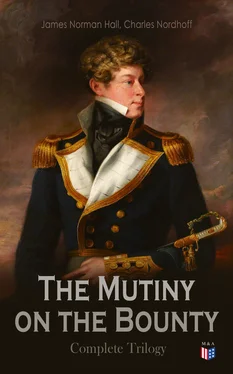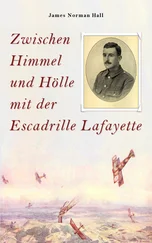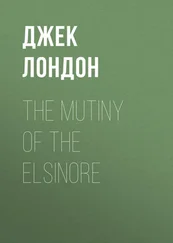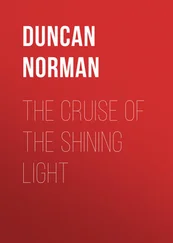1 ...8 9 10 12 13 14 ...48 While the Bounty was still in the northeast trades, an incident occurred which gave us reason to suspect Bligh of meanness of this kind. The weather was fine, and one morning the main hatch was raised and our stock of cheeses brought up on deck to air. Bligh missed no detail of the management of his ship; he displayed in such matters a smallness of mind scarcely in accord with his commission. This unwillingness to trust those under him to perform their duties is apt to be the defect of the officer risen from the ranks,—or “come in through the hawse-hole,” as seamen say,—and is the principal reason why such officers are rarely popular with their men.
Bligh stood by Hillbrandt, the cooper, while he started the hoops on our casks of cheese and knocked out the heads. Two cheeses, of about fifty pounds weight, were found to be missing from one of the casks, and Bligh flew into one of his passions of rage.
“Stolen, by God!” he shouted.
“Perhaps you will recollect, sir,” Hillbrandt made bold to say, “that while we were in Deptford the cask was opened by your order and the cheeses carried ashore.”
“You insolent scoundrel! Hold your tongue!”
Christian and Fryer happened to be on deck at the time, and Bligh included them in the black scowl he gave the men near by. “A damned set of thieves,” he went on. “You’re all in collusion against me—officers and men. But I’ll tame you—by God, I will!” He turned to the cooper. “Another word from you and I have you seized up and flogged to the bone.” He turned aft on his heel and bawled down the ladderway. “Mr. Samuel! Come on deck this instant.”
Samuel came trotting up to his master obsequiously, and Bligh went on: “Two of the cheeses have been stolen. See that the allowance is stopped—from the officers too, mind you—until the deficiency is made good.”
I could see that Fryer was deeply offended, though he said nothing at the time; as for Christian,—a man of honour,—his feelings were not difficult to imagine. The men had a pretty clear idea of which way the wind blew by this time, and on the next banyan day, when butter alone was served out, they refused it, saying that to accept butter without cheese would be a tacit acknowledgment of the theft. John Williams, one of the seamen, declared publicly in the forecastle that he had carried the two cheeses to Mr. Bligh’s house, with a cask of vinegar and some other things which were sent up in a boat from Long Reach.
As the private stocks of provisions obtained in Spithead now began to run out, all hands went “from grub galore to the King’s own,” as seamen say. Our bread, which was only beginning to breed maggots, was fairly good, though it needed teeth better than mine to eat the central “reefer’s nut”; but our salt meat was unspeakably bad. Meeting Alexander Smith one morning when he was cook to his mess, I was shown a piece of it fresh from the cask—a dark, stony, unwholesome-looking lump, glistening with salt.
“Have a look, Mr. Byam,” he said. “What it be, I wonder? Not beef or pork, that’s certain! I mind one day on the old Antelope—two years ago, that was—the cooper found three horseshoes in the bottom of a cask!” He shook his pigtail back over his shoulder and shifted a great quid of tobacco to his starboard cheek. “You’ve seen the victualing yards in Portsmouth, sir? Pass that way any night, and you hear the dogs bark and the horses neigh! And I tell you something else you young gentlemen don’t know.” He glanced up and down the deck cautiously and then whispered: “It’s as much as a black man’s life is worth to pass that way by night! They’d pop him into a cask like that!” He snapped his fingers impressively.
Smith was a great admirer of Old Bacchus, whom he had known on other ships, and a few days later he handed me a little wooden box. “For the surgeon, sir,” he said. “Will you give it to him?”
It was a snuffbox, curiously wrought of some dark, reddish wood, like mahogany, and very neatly fitted with a lid; a handsome bit of work, carved and polished with a seaman’s skill. I found leisure to visit the surgeon the same evening.
Christian’s watch was on duty at the time. Young Tinkler and I were in Mr. Fryer’s watch, and the third watch had been placed in charge of Mr. Peckover, a short, powerful man of forty or forty-five, who could scarcely remember a time when he had not been at sea. His good-humoured face had been blackened by the West Indian sun, and his arms were covered with tattooing.
I found Peckover with the doctor and Nelson—squeezed together on the settee.
“Come in,” cried the surgeon. “Wait a bit, my lad—I think I can make a place for you.”
He sprang up with surprising agility and pushed a small cask into the doorway. Peckover held the spigot open while the wine poured frothing into a pewter pint. I delivered the snuffbox before I sat down on my cask, pint in hand.
“From Smith, you say?” asked the surgeon. “Very handsome of him! Very handsome indeed! I remember Smith well on the old Antelope—eh, Peckover? I have a recollection that I used to treat him to a drop of grog now and then. And why not, I say! A thirsty man goes straight to my heart.” He glanced complacently about his cabin, packed to the hammock battens with small casks of spirits and wine. “Thank God that neither I nor my friends shall go thirsty on this voyage!”
Nelson stretched out his hand for the snuffbox and examined it with interest. “I shall always marvel,” he remarked, “at the ingenuity of our seamen. This would be a credit to any craftsman ashore, with all the tools of his trade. And a fine bit of wood, handsomely polished, too! Mahogany, no doubt, though the grain seems different.”
Bacchus looked at Peckover quizzically, and the gunner returned the look, grinning.
“Wood?” said the surgeon. “Well, I have heard it called that, and worse. Wood that once bellowed—aye, and neighed and barked, if the tales be true. In plain English, my dear Nelson, your mahogany is old junk, more politely called salt beef—His Majesty’s own!”
“Good Lord!” exclaimed Nelson, examining the snuffbox in real astonishment.
“Aye, salt beef! Handsome as any mahogany and quite as durable. Why, it had been proposed to sheathe our West India frigates with it—a material said to defy the attacks of the toredo worm!”
I took the little box from Nelson’s hand, to inspect it with a new interest. “Well, I’m damned!” I thought.
Old Bacchus had rolled up his sleeve and was pouring a train of snuff along his shaven and polished forearm. With a loud sniffing sound it disappeared up his nose. He sneezed, blew his nose violently on an enormous blue handkerchief, and filled his tankard with mistela.
“A glass of wine with you gentlemen!” he remarked, and poured the entire pint down his throat without taking breath. Mr. Peckover glanced at his friend admiringly.
“Aye, Peckover,” said the surgeon, catching his eye, “nothing like a nip of salt beef to give a man a thirst. Let the cook keep his slush. Give me a bit of the lean, well soaked and boiled, and you can have all the steaks and cutlets ashore. Begad! Just suppose, now, that we were all wrecked on a desert island, without a scrap to eat. I’d pull out my snuffbox and have one meal, at any rate, while the rest of you went hungry!”
“So you would, surgeon, so you would,” said the gunner in his rumbling voice, grinning from ear to ear.
Table of Contents
One sultry afternoon, before we picked up the southeast trades, Bligh sent his servant to bid me sup with him. Since the great cabin was taken up with our breadfruit garden, the captain messed on the lower deck, in an apartment on the larboard side, extending from the hatch to the bulkhead abaft the mainmast. I dressed myself with some care, and, going aft, found that Christian was my fellow guest. The surgeon and Fryer messed regularly with Bligh, but Old Bacchus had excused himself this evening.
Читать дальше











